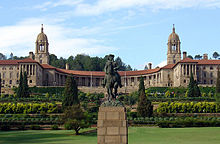Government of South Africa
| South African Government | |
|---|---|
 | |
| Overview | |
| Established | 6 September 1968 |
| State | |
| Leader | President (Cyril Ramaphosa) |
| Appointed by | National Assembly of South Africa |
| Main organ | Cabinet of South Africa |
| Ministries | 30 |
| Responsible to | Parliament of South Africa |
| Annual budget | |
| Headquarters | Union Buildings, Pretoria |
| Website | www |
The Republic of South Africa is a parliamentary republic with a three-tier system of government and an independent judiciary, operating in a parliamentary system. Legislative authority is held by the Parliament of South Africa.
Executive authority is vested in the President of South Africa who is head of state and head of government, and his Cabinet.
The President is elected by the Parliament to serve a fixed term.
South Africa's government differs from those of other Commonwealth nations. The national, provincial and local levels of government all have legislative and executive authority in their own spheres, and are defined in the South African Constitution as "distinctive, interdependent and interrelated".
Operating at both national and provincial levels ("domes") are advisory bodies drawn from South Africa's traditional leaders. It is a stated intention in the Constitution that the country be run on a system of cooperative governance.
The national government is composed of three inter-connected branches:
- Legislative: Parliament, consisting of the National Assembly and the National Council of Provinces
- Executive: The Head of Government
- Judicial: The Supreme Court of Appeal, and the High Court
All bodies of the South African government are subject to the rule of the Constitution, which is the supreme law in South Africa.
Legislative

| This article is part of a series on the |
| Politics of South Africa |
|---|
 |
|
|
The Parliament of the Republic of South Africa is
From 1910 to 1994, members of Parliament were elected chiefly by the South African
Executive


The
Judicial
The third branch of the national government is an independent judiciary. The judicial branch interprets the laws, using as a basis the laws as enacted and explanatory statements made in the Legislature during the enactment. The legal system is based on
- Magistrates' Courts– The court where civil cases involving less than R100 000, cases.
Provincial government
| This article is part of a series on the |
| Politics of South Africa |
|---|
 |
|
|
The nine
The provincial governments are structured according to a
Local government
Municipalities are governed by municipal councils which are elected every five years. The councils of metropolitan and local municipalities are elected by a system of mixed-member proportional representation, while the councils of district municipalities are partly elected by proportional representation and partly appointed by the councils of the constituent local municipalities.[8]
Opposition
In each legislative body, the party or coalition of parties holding a majority of seats forms the government. The largest party not in the government is recognised as the official opposition.
References
- ^ https://www.treasury.gov.za/documents/National%20Budget/2024/sars/Budget%202024%20Highlights.pdf
- ^ Constitution of the Republic of South Africa, 1996, s. 42 Archived 13 April 2014 at the Wayback Machine
- S2CID 158523324
- S2CID 258076520.
- ^ "LOOK: Check out the National Assembly's 'new' venue [PICS]". The South African. 2022-01-14. Retrieved 2022-01-14.
- ^ except for the Prince Edward Islands, although they are for certain legal purposes deemed to fall within the City of Cape Town.
- ^ "Municipal elections: fact file". Media Club South Africa. 11 May 2011. Retrieved 24 May 2012.
- ^ "Understanding Local Government". Community Organisers Toolbox. Education and Training Unit. Retrieved 24 May 2012.
